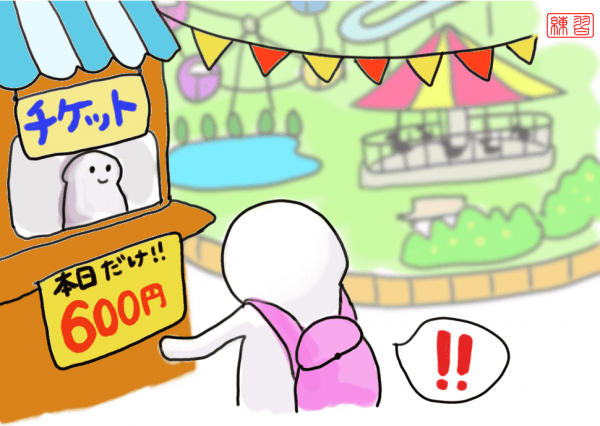Like A; Seems A; Appears to be A
Used for information directly seen/heard/etc. by the speaker

今日は600円で入れるみたいだ。
It seems like you can enter for 600 yen today.
12
彼女は歌手みたいに歌が上手いんだ。
She's good at singing, like a (professional) singer.
8
このお茶はコーヒーみたいな色だね。
This tea is a coffee-like color.
Getting the sentences
Construction
(Elements in parentheses are optional.)
Basic Examples:
足跡だったみたい (looks like footprints)
跳ぶみたいだ (appears to be jumping)
新鮮みたい (looks fresh)
楽しいみたい (looks like fun)
Related Expressions
ようだ
Where this grammar is found
User notes
Stupie
らしい
Level: 86
(8 months ago)
みたい = よう
- N1 က N2 နဲ့တူတယ်လို့ပြောချင်ရင် みたい
- အဲ့ကောင်လေးက ဆံပင်ရှည်ရှည်နဲ့ ကောင်မလေးနဲ့တောင်တူတယ် / ဒီအိမ်ကြီးက ခမ်းနားလွန်းလို့ ဟိုတယ်နဲ့တူ၊ နွေဦးဆိုပေမဲ့ မိုးအုံ့နေလို့ မိုးရာသီနဲ့တူ
- လို့ထင်တယ်
- လူတွေတစ်အားပြုံနေတယ် accident ဖြစ်တယ်လို့ထင်တယ်
- အဖြစ်ပျက်တစ်ခုလုံးကိုခြုံငုံကြည့်ပီး စိတ်ထဲက ယူဆလိုက်တာ
らしい
- らしい က ဒီN1 က ဒီN1 နဲ့တူတယ် (ပီသတဲ့ပုစံမျိုး)
- ခုမှပဲ မိုးရာသီက မိုးရာသီနဲ့တူတော့တယ် ၊ ကလေးက တစ်ကယ်ကလေးနဲ့တူ၊ မိန်းကလေးက မိန်းကလေးပီသတယ်
- ခုမှပဲ မိုးရာသီက မိုးရာသီနဲ့တူတော့တယ် ၊ ကလေးက တစ်ကယ်ကလေးနဲ့တူ၊ မိန်းကလေးက မိန်းကလေးပီသတယ်
- လို့ကြားတယ်
- သူလက်ထပ်သွားပြီလို့ကြားတယ် ၊ နေမကောင်းဘူးလို့ကြားတယ်
- သူလက်ထပ်သွားပြီလို့ကြားတယ် ၊ နေမကောင်းဘူးလို့ကြားတယ်
0
Lang_learner
Level: 1
(10 years ago)
For further clarification.
みたいに is used to say that the subject "does/did do something like something". For example:
君は女の子みたいに踊るよ。"You dance like a girl!" Or
あなたはパーティーで動物みたいに食べたよ!"You ate like an animal at the party!"
While みたいな is used to say "like".
For example:
モデルみたいな女性です。"A model like girl."/ "a girl that looks like a model."
男の人みたいな女の人ですね。"A woman that looks like a man."
Although みたいな is much like みたいだ, the difference between the two is that みたいな allows you to expound on a sentence.
For instance:
あなたみたいな人がすきです。"I like people like you."
トムみたいな人はとても楽しいですよ。"People like Tom are very fun."
I hope you found this helpful!
みたいに is used to say that the subject "does/did do something like something". For example:
君は女の子みたいに踊るよ。"You dance like a girl!" Or
あなたはパーティーで動物みたいに食べたよ!"You ate like an animal at the party!"
While みたいな is used to say "like".
For example:
モデルみたいな女性です。"A model like girl."/ "a girl that looks like a model."
男の人みたいな女の人ですね。"A woman that looks like a man."
Although みたいな is much like みたいだ, the difference between the two is that みたいな allows you to expound on a sentence.
For instance:
あなたみたいな人がすきです。"I like people like you."
トムみたいな人はとても楽しいですよ。"People like Tom are very fun."
I hope you found this helpful!
12
Discussion about this grammar